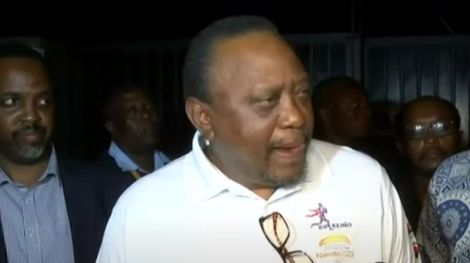The First Born Son To Former President Uhuru Kenyatta Navigates Firearm License Dispute Through Negotiations
In a compelling legal saga, former Kenyan President Uhuru Kenyatta’s son, Jomo Kenyatta, finds himself at the center of a firearm license dispute that has taken unexpected twists and turns. The unfolding drama involves Jomo’s legal battle against the government’s attempt to revoke his gun license, with negotiations now taking center stage as both parties explore an out-of-court settlement.
Jomo, through his Senior Counsel Fred Ngatia, informed the High Court that negotiations were underway to resolve the matter without a protracted legal battle. Ngatia requested a mention date of January 31, 2024, where a potential consent agreement could be recorded, indicating progress in the talks.
State Counsel Munene Wanjohi affirmed the ongoing negotiations, leading the court to extend existing orders until January 31. However, the Attorney General expressed concerns about Jomo’s case, citing a lack of evidence to substantiate claims of his firearm license being revoked.
Jomo’s legal journey began when he filed a lawsuit in July, challenging the government’s decision to withdraw his gun license. The Attorney General, supported by the Firearm Licensing Board, sought to dismiss the case, labeling it based on speculation and urging Jomo to explore alternative dispute resolution mechanisms.
The court documents revealed that Jomo, feeling aggrieved, sought an order to prohibit the Chief Licensing Officer and the Firearm Licensing Board from confiscating his firearm. Additionally, he aimed to quash their unilateral decision to revoke his license without due process.
Justice Jairus Ngaah, responding to Jomo’s plea, suspended the decision to revoke the firearm license pending a full hearing. The court deemed the matter urgent, certifying it for judicial review orders.
The core argument from Jomo’s side was the alleged violation of his constitutional rights, emphasizing that the government’s actions were initiated in bad faith and contrary to natural justice. Ngatia argued that Jomo, a law-abiding citizen with no history of firearm misuse, deserved fair treatment under the Firearms Act.
Jomo’s concerns extended to the manner in which police officers reportedly raided his home in Karen on July 21, demanding the surrender of firearms without providing a clear justification.
Ngatia stated, “On inquiry as to the reasons if any, that had caused an abrupt demand for my firearms, the officers feigned ignorance.”
The Firearm Licensing Board, led by Chairman Rashid Yakub, vehemently denied any involvement in the alleged raid and refuted claims of intent to cancel Jomo’s license.

Yakub emphasized, “I am a stranger to the happenings of 21 July and confirm that I did not instruct any police officers to raid Jomo’s residence.”
Despite the board’s denial, Jomo expressed fear that the government might employ strong-arm tactics, potentially jeopardizing his safety and inviting unwanted attention from criminals. Ngatia argued that the police’s actions were geared toward attracting publicity, a situation detrimental to Jomo’s security.
State Counsel Munene Wanjohi, while acknowledging the negotiations, criticized Jomo for not exhausting remedies available under the Firearms Act before resorting to legal action. He emphasized that courts should not be burdened with matters where alternative dispute resolution mechanisms exist.
As the legal battle unfolds, former President Uhuru Kenyatta has defended his family’s gun ownership as legitimate. He clarified that his two sons, Jomo and Muhoho, collectively own six guns, all legally registered. The former president dismissed claims of his involvement in financing anti-government protests, asserting that he received a distress call from Jomo prompting his visit.
The court’s temporary suspension of the firearm license revocation sets the stage for a more in-depth hearing on September 27. Jomo’s legal team, led by Ngatia, aims to overturn the decision, highlighting the alleged lack of procedural adherence and arbitrary confiscation.
In a nation closely watching the legal intricacies surrounding Jomo Kenyatta’s firearm license, the January 31 mention date could unveil the outcome of the negotiations, shedding light on whether an out-of-court settlement will be reached or if the legal battle will persist in the pursuit of justice.